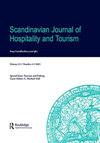Regional fishing site preferences of subgroups of Finnish recreational fishers
IF 3.1
4区 管理学
Q2 HOSPITALITY, LEISURE, SPORT & TOURISM
Scandinavian Journal of Hospitality and Tourism
Pub Date : 2021-08-08
DOI:10.1080/15022250.2020.1860814
引用次数: 4
Abstract
ABSTRACT Understanding relevant subgroupings, among local and traveling recreational fishers, is critical for the tourism sector and fisheries managers. Subgroups may notably differ in fishing activity styles, commitment, traveling across provinces and demand for fishing activities. We analyzed survey data originally collected from registered Finnish recreational fishers in 2018. The reported number of fishing days and methods were used to construct profiles. Separate travel cost models were then fitted to explain factors associating with recreational fishing activities in the main fishing provinces, using the variety of cost, demographics, and profile as explanatory variables. The recreational use value of a fishing day and the total recreational use value of fishing in Finland were estimated. The most attractive province, Lapland, received the highest number of visiting fishers, and highest use value per fishing day. Active anglers spent more days fishing in Finland in general and in Lapland than other profiles. Active generalists were more frequent fishers in Southern Savonia and in marine areas than other profiles. The most common fishing destination for Finnish recreational fishers was their own residential province. These findings help fishery managers identify the most potential areas for improving fishing opportunities and to predict changes in visitation behavior.芬兰休闲渔民亚群的区域钓鱼地点偏好
摘要了解当地和旅游休闲渔民的相关分组对旅游业和渔业管理者至关重要。分组在捕鱼活动风格、承诺、跨省旅行和捕鱼活动需求方面可能存在显著差异。我们分析了2018年芬兰注册休闲渔民的调查数据。所报告的捕鱼天数和方法被用于构建概况。然后,使用成本、人口统计和概况的多样性作为解释变量,拟合单独的旅行成本模型来解释与主要捕鱼省份的休闲捕鱼活动相关的因素。估算了芬兰一个捕鱼日的娱乐利用价值和捕鱼的娱乐利用总价值。最具吸引力的省份拉普兰接待了最多的到访渔民,每个捕鱼日的使用价值最高。活跃的垂钓者在芬兰和拉普兰的钓鱼时间比其他地区多。活跃的多面手在萨沃尼亚南部和海洋地区比其他地区更频繁地捕鱼。芬兰休闲渔民最常见的捕鱼目的地是他们自己的居住省份。这些发现有助于渔业管理者确定最有可能改善捕鱼机会的领域,并预测访问行为的变化。
本文章由计算机程序翻译,如有差异,请以英文原文为准。
求助全文
约1分钟内获得全文
求助全文
来源期刊
CiteScore
7.90
自引率
8.30%
发文量
14
期刊介绍:
Scandinavian Journal of Hospitality and Tourism is the leading Nordic journal for hospitality and tourism research. SJHT aims at initiating and stimulating high-impact and innovative research relevant for academics and practitioners within the hospitality and tourism industries. The journal takes an interdisciplinary approach including, but not limited to geography, psychology, sociology, history, anthropology, and economics. SJHT encourages research based on a variety of methods, including both qualitative and quantitative approaches. The journal covers all types of articles relevant to the Nordic region, as well as the North Atlantic, North Sea and Baltic regions. We also welcome reviews and conceptual articles with a broader geographical scope that clearly enhance the theoretical development of the hospitality and tourism field. In addition to research articles, we welcome research notes and book reviews. Published articles are the result of anonymous reviews by at least two referees chosen by the editors for their specialist knowledge.

 求助内容:
求助内容: 应助结果提醒方式:
应助结果提醒方式:


